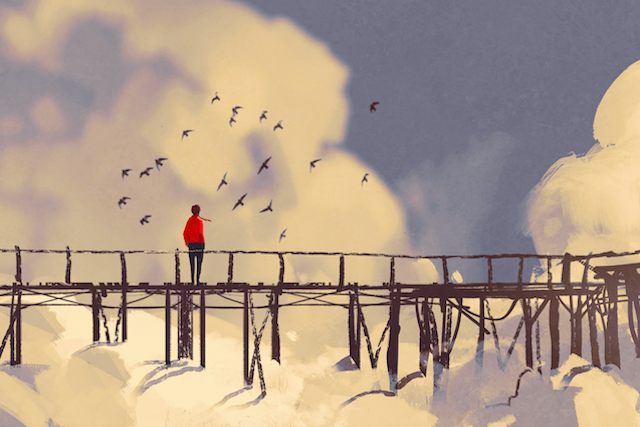
“What will mess you up most in life is the picture in your head of how it is supposed to be.” ~Unknown
I expected to get into college. I expected to have a career after a lot of hard work, and that one day I’d meet a nice man and we would get married. We would buy our first house together and start a family, picking out a crib and the baby’s “going home” outfit and organizing a drawer full of diapers. We’d have more babies and go on vacations and grow old together.
I expected that one day I’d take care of him until he took his last breath, and then I’d join a travel group with other retired women. My adult children would come over for dinner, and we’d take a family vacation with the grandchildren every year. That’s how it all played out in my mind.
I had a linear view of life. You go to point A, B, C, and so on. You do what you’re supposed to do and you work hard. It was very simple, life with these expectations. Follow the recipe and then eat your dessert.
Spoiler alert: Life was only that simple until the universe pulled the rug out from beneath my feet.
It was an ordinary school day when my life fell apart. These sort of things usually happen on ordinary days.
My husband and I were both teachers, and we woke up before the sun rose to begin our assembly line of breakfast and lunch preparations. Afterward we’d wrangle children and get them dressed and ready for departure, which was basically like herding cats. Then, he dropped them off at their respective places. I picked everyone up after school.
In between all of that we worked and went to meetings and ran errands and bathed children and cooked dinner and tended to all the usual moving parts of domestic life.
Except on that ordinary day, none of it happened.
On April 27, 2016 I woke up and found my husband dying on the living room floor. Out of left field, in an instant, the life I expected was gone.
I never considered the possibility of becoming a thirty-four-year-old widow with a one-year-old who I was still nursing, a three-year-old barely talking in sentences, and a six-year-old only two months away from his kindergarten graduation.
I was thrust into an alternate reality of gnarled, tangled grief, and it was in this new place that I had the painful realization that the life I knew, the one that was familiar and most comfortable to me, was over.
My husband and I planned each of our children down to the day. We even had number four, the one who would never be, scheduled in the calendar.
But now I was a single mother. A widow.
It’s kind of embarrassing to admit, but during this time I wasn’t only mourning the loss of my husband. Sure, I missed him so much that I couldn’t eat. I couldn’t sleep. I lived my days in exile, not knowing where I belonged. The tediousness of my new life as a single mother wore me down to the bones. The loneliness that festered inside of me created a painful hollowness that felt hopeless; the unfairness of this cosmic roll of the dice made me want to give up more times than I would like to admit.
But there was something else I was grieving: the loss of the life that I expected to live. My dashed expectations. The trajectory of my life that was forever altered, now headed in an unknown direction that felt like it would surely kill me.
We expect our lives to materialize the way we envision them in our hopes and dreams. When life doesn’t go as planned, it can be difficult to reconcile the disappointment of our new reality. Resistance is the first defense. We don’t want to believe or accept the change.
This wasn’t the life I chose. I deserved something better, I thought. “This” seemed so patently unfair. Surely there were worse people who were more deserving of this kind of lightning to strike them instead—so why me? I clung to those thoughts and let them bury me deeper and deeper into the abyss. The resistance might have been the catalyst to the darker parts of grief.
It’s such a disappointing, embarrassing revelation when you realize that you never actually had complete control. It feels like you were lied to. All of those years you spent with your first-world blinders on, thinking that you could plan every detail. It was cute while it lasted. Now it just felt stupid.
I realized what expectations really were.
Nothing.
My expectations were never real. They were nothing more than thoughts in my head. Assumptions. Desires. Never guarantees.
It was always like that, but for me it had been on a micro level. Micro-disappointment, like not getting the job I thought I wanted. A relationship that ended. Losing a bid on a house. I never prepared myself for the real disappointment in life. Earth-shattering disappointment that makes your world crumble and introduces you to your new constant companion: pain.
We usually think the bad stuff we hear about only happens to other people. We’re aware that it exists, but not in our reality. Just an abstract thing somewhere else in the world.
Until it happens to us.
I remember how mad my husband used to get when I’d be surfing Facebook, bemoaning that so-and-so got a new car, or how in love a couple seemed to be, and why can’t we go to Hawaii like so-and-so?
“Everyone puts their best on Facebook,” Kenneth told me. “It doesn’t mean anything.”
“No,” I insisted, shaking my head. “So-and-so and so-and-so are madly in love. Look at how passionate they are with each other. Why don’t we hold hands like that?”
“We have three kids under five,” he said, rolling his eyes.
I wish Kenneth lived long enough to know that the so-and-so’s got divorced. He would have told me “I told you so.” And for once, I would have gladly told him he was right.
It’s memories like those that I like to lean into. Life can’t be as horrible or as wonderful as it appears in my head. There has to be middle ground.
When I’m feeling an extreme of any emotion, I have to remind myself of this. It’s just thoughts in my head. Sandcastles built out of feelings, and sandcastles get washed away when the tide rises and brings in a new day. It’s not a matter of being a good or a bad thing. It just is.
My expectations have been a thing that I’ve had to live with my entire life. I’ve always had high expectations for myself. Failure was not supposed to be a thing. As a widow, I found myself floundering in a new reality where I felt like I was constantly failing. Legitimately not capable of doing what I once could.
I wasn’t the same mother to my children. This new me had less time and patience. She was more tired and overworked and in pain. I had to learn to live with the limitations of my new life. My disappointment pooled inside of me like poison. Nothing I could do was enough. I wasn’t enough. Those are all very toxic feelings to carry around when you are already drowning in grief.
But there is only so much time you can spend falling deeper into your pit of despair. One day you realize that you are no longer falling and have in fact reached the bottom. There you are, alone with your despair, so sick of yourself that you can’t even handle your own negative thoughts anymore. You can’t take one more second of it.
This is your moment to get up and wash yourself off and start over.
When the despair stops roaring in your ears and you have a moment of quiet, you can begin to think objectively about your life. Your new life.
I realized what was wrong with me. My problem, I decided, came from my expectations. They were the root cause of my despair.
I expected a long life with my husband, even though he was always a mortal being who was never promised to be mine forever. I expected a lot of things, except for the only thing that was true about life: We are only guaranteed today. Yesterday is over. Tomorrow is unknown.
I knew I wanted to live as best as I could. I wanted a fulfilling life that was hopeful, joyful, and meaningful. I’d have to change my expectations if I wanted all of that. It was impossible to get rid of the expectations completely. I’m only human. Besides, expectations do serve a purpose. They’ve helped me in life. They’ve also hurt me.
The middle ground, I decided, was finding “flexible expectations.” I couldn’t be rigid in my thinking. I wanted to have standards and goals, but I needed to have wiggle room for the inevitableness of life not going as planned.
I had to become more resilient and strategic about my setbacks. I needed to have long-term perspective and not feel like individual moments in my life were the be-all, end-all. I needed to be less attached to a prescribed way to live.
You realize that in a world full of uncontrollable circumstances, the most powerful line of defense that you have completely in your control is how you think.
Your attitude.
Your perspective. Is that glass half-full or half-empty? You decide.
How you think is your resilience. Your ability to get back up and dust yourself off. The way that you know life is worth living, not only during the moments of joy, but also during the challenges and pain and heartbreak, and this is the reason you persevere.
Maybe my expectations never betrayed me after all. Maybe it was actually supposed to be one of my greatest teachers in life.
Around a year after my husband died, I sat down and made a list of “good” and “bad” from the past year. It had gone by in such a blur that I felt like I needed to go back over the details. I anticipated a pity party as I recalled all of the terribleness.
The bad: my husband died. Single.
The good: new friendships, a loving community who showed up for us when we needed them, trips to Japan and Italy and Denmark, saw an old friend for the first time in eleven years, more productive than ever with my writing, my kids were happy and adjusted little people, we had a nice roof over our heads, I loved my job that didn’t feel like a job, we were healthy, I worked on the election (even if it meant precinct walking with the toddler on my back as a single mother—but I did it!), and so much more. I kept thinking of new things to add to the list.
It was very telling. We tend to focus on the negative. My mind wanted to go back to the dark moments of the past year. But after re-reading the list, it was clear that the year wasn’t all bad. There were many bright spots in the hardest year of my life.
Mooji said, “Feelings are just visitors. Let them come and go.”
I try to always remember that.
It’s okay to feel terrible. You aren’t broken for feeling that way. You just can’t let yourself get attached to the feelings. There will be days when life feels too hard. You will feel pain and loneliness and fear that will make you suffer. None of it reflects who you are, nor are they any indication of what your future looks like. They are merely the temporary visitors.
When the feelings visit me, I acknowledge the pain. Hunker down. Maybe clear my schedule. Lower my expectations of productivity. Give myself permission to rest while I let the thoughts pass. Then I move on. It’s not that you ever forget the pain, but moving on is a way to compartmentalize it so it does not destroy you.
Eighteen months later, I’m a different person than who I was before my husband died. It’s not the life that I initially chose, but in many ways I am living a more intentional life with a lot more choice. There is some degree of excitement in what I call my “renaissance.” There are no rules. You just live as authentically as you can, with what you have, doing the best you can, and that’s it. No secrets.
Everything that you need to persevere is already inside of you, and this truth is liberating.
About Teresa Shimogawa
Teresa Shimogawa is a human being trying to do good things in the world. She is a teacher, storyteller, and currently studying to be a Shin Buddhist minister’s assistant. She writes at www.houseofteresa.com.
- Web |
- More Posts













 Though I run this site, it is not mine. It's ours. It's not about me. It's about us. Your stories and your wisdom are just as meaningful as mine.
Though I run this site, it is not mine. It's ours. It's not about me. It's about us. Your stories and your wisdom are just as meaningful as mine.
Thank you so much for this … grief is something that I struggled with, lost my Mum to cancer almost 7 years ago now, and my Aunt almost 2 years ago to Cancer … she was my rock. The tidal wave that came with the grief just was overwhelming, I became so accustomed to feeling sad it became my norm. After my Aunt died, I just fell deep into the darkness, and like you mentioned, I became fed up of the thoughts, the destructive actions … and I had to fight back. Been about 9 months now, meditate daily, take my meds, exercise and dress myself properly … I still suffer from loneliness, but I accept that and get myself more involved with clubs outside of work. Small changes to my habits are small wins.
All the best. Mike
Loneliness is hard. I’ve found that losing your loved ones is the ultimate reminder that we have to build a life in which we can be content being in our own company. It’s almost like being in a new relationship when learning about the other person and the discovery is the exciting part–only this is with yourself.
What a wonderfully profound – I hate to say article – writing. Wow. It has me in tears, not in pity for you but in empathy for someone who has had their world rocked. I wish I would have had this available 16 years ago when my life fell apart – I know it would’ve helped. Bless you and your children and thank you for the comfort and insight uoungive to people. I’ll definitely be sharing this on on FB. Not to leave out men, but women who lose their husbands, In whatever way, and are left with the kids, the house, the bills, and the emptiness, become the strongest beings on the planet. We can move mountains. Fight on warrior!
Thank you so much. We can move mountains, one scoop of dirt at a time. 🙂
I LOVE this article, thank you SO much for writing it. I myself find my self in that situation but a bit different. My son at the age of 7 months was diagnosed with degenerative muscle issue. And i am reminded daily of what I thought of what life should’ve been.
Its a different type of loss, thankfully he’s still alive, but I didn’t have my healthy baby. I didn’t get to take him swimming (he is on a breathing machine), nor to the park, but I have to learn to adapt and it is hard. I still struggle with it and I am so angry. But I have to provide my son with the best life and continue to move forward…
Thank you. That is difficult re: your son. We all have these preconceived ideas of what parenthood will look like, and it never usually has the messy parts in it. You have every right to hurt and be angry. I tell myself often that I need to be patient enough to witness the meaning behind all of this.
Dear Teresa Shimogawa,
Thank you very much for the well written article. I’m a 20’s woman who resisted life when it didn’t go my way. And when i look at you, i see an enlightened soul. You don’t really lose your loved ones. They are living through yourself and your children. Your life is reckoning you to enjoy every moment because memories have no expiry date.
Thank you for the comment. There is definitely an energy from loved ones that gets carried within–forever.
Thank you for sharing your story
“The most painful state of being is remembering a future, particularly the one you’ll never have.” – Kierkegaard
Love this quote!
You are so amazingly strong. I feel you with the loss of a close loved one but its hard to remember you only have today and to appreciate the people that are in your life every day no matter how much they bug you. I admire your strength and your words. Much love and hugs and thank you so much for sharing. Peace!
Thank you, Abigail. It is hard to remember. That’s why I’m a big believer in sharing the hard parts of life and learning from each other. Those can become our reminders about the fragility of life.
This is everything that Buddhism is. Looking at what is. Facing reality with truth. Your words are better than any Buddhist retreat I have attended, or meditation I have done. I am liberated by your words…
Thank you, Carah. 🙂
I have been following your blog since last year and I just want to say that I am so happy to see your article here on tiny Buddha.
Can’t wait to read many more soon!
Love and light to you <3 <3 <3
They you so much, Nad. I’m super excited that I haven’t scared you off yet. 🙂
Thank you, Teresa, for sharing your thoughts about living with expectations. I agree. I must give up my limiting expectations, and change my attitude. I’m so sad you lost your husband, but your attitude is courageous.
Thanks, Amy!
A great example of one tough lady. Somehow you found the courage to get through this horrible hand dealt to you. You are amazing!!!!!
Thank you, Jay.
This is by far one of the most beautiful, heart touching, resonating articles I have have read thus far, my heart goes out to you for your loss and happy that you have in fact picked up and have moved on, your amazing. I have because of you have changed my intentions from, expectation to flexible expectation. Have a blessed life.😊
Thank you for your kind words, Scott.
Loved these words of wisdom. I’m in an imbalanced time in my life. I’m not sure what life holds for me, as I’m in transition, but I’m moving forward everyday anyway. I have all that I need even with massive changes. I’m so sorry about the loss of your husband. I will hold mine a little longer tonight. Gratitude for what and whom we have is so important.
Thanks, MJ. Baby steps…you can’t move mountains overnight. Just one handful of dirt at a time.
I’m so sorry for your loss Teresa. This is so beautifully well said and so true… Expectations… You learn a lot about them and about yourself… Thank you for writing this!
Thank you!
Great article Teresa!
Thanks so much for sharing your wisdom.
Sorry for your loss xx
Thank you, Barry.
I’m sorry for your loss but congrats on seeing the positive. Pain is certainly a great teacher if we’re open to learning. It can’t be easy but it sure makes us stronger. I also became a widow of two young children many years ago and what you wrote about expectations described exactly how I felt. Thank you for writing this. It surely validated my feelings and helped me. I wish you all the very best! Thanks!
Thank you!
I went to warm up a bottle for my son when i walked by the livingroom i found my husband on the floor, lips purple. 911 was called, he died of a heart attack. He was 26 and i was 22. Turns out he had hypertrophic cardiomyopathy. I was a widow at 22 our son was 3 days shy of his first birthday. I am now 43 and feel greatful for the small amount of time we had together, instead of fixating on that horrible night.
So sorry for your loss.
Your article took me down memory lane of my own life. My husband and I were also educators and then, I was widowed at age 32. You perfectly described everything I had gone through, too. The shock, deep depression, feeling sad, I could hardly get through the day due to the painful grief, etc… I kept telling myself that I could work through all of this pain and I did! I allowed the pain to heal me and I did get rid of having expectations. I often used your exact words, “I felt as though a rug had been pulled out from under me.” Yes, I became such a more mindful person as life marched on because I now had the contrast of a deep loss vs. my expectations being happily fulfilled. I now welcome set-backs because they are lessons from which we learn and grow. It has now been 31 years since his death and I have not allowed myself to forget that pain because it makes me such a better and kinder person. I did a lot of thinking during that time. Something I would often say,”Don’t live your life as though today is your last day. It’s best to treat others as though it’s their last day.” ~ Deanna Voelker
We don’t know what others are going through and just being kind is the best way to live. Thank you for your article.
Thanks, Deanna. I also like to hear other people’s stories. It definitely reminds us that we are not alone on these journeys!
Thanks Teresa for sharing.. it helped me to come out of my current situation which was bad because of my EXPECTATIONS
This article captures the feelings j have right now perfectly. I’m depressed just cause I can’t get a job I like. And it feels like I’m drowning and there is no way out. I wake up like this everyday and I hate it. I don’t even have the motivation to attend school. These articles form tiny Buddha keep me sane.
Beautiful article. Thank you for sharing your insights and experience
An inspiring article ma’am. It surely gives gives an individual a new perspective on how to cope up with unexpected circumstances that overshadow our lives and look at the brighter side to everything.
Resonates… Having lost my love of 36 years, I felt as though the future chapters of my “book of life” (the imagined future that any of us could write at any moment) were ripped out and tossed into the wind. That overwhelming sense of loss was truly debilitating for a time… after many long pondering night walks, I came to understand that the pages were still there, and just as blank as they always had been. “My expectations were never real. They were nothing more than thoughts in my head. Assumptions. Desires. Never guarantees.” Thank you.
This was a wonderful read, thank you for sharing your story Theresa